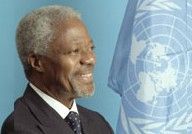Annan urges new Security Council steps on Darfur
By Irwin Arieff
UNITED NATIONS, Nov 3 (Reuters) – Violence has increased in Sudan’s Darfur region and the U.N. Security Council should put more pressure on the government and rebels to stop the fighting, U.N. Secretary-General Kofi Annan said on Wednesday.
 Attacks are on the rise as both sides try to grab more territory, a new rebel movement has emerged and there has been no verified progress in disarming fighters, as both sides have promised, Annan said in his latest progress report on Darfur.
Attacks are on the rise as both sides try to grab more territory, a new rebel movement has emerged and there has been no verified progress in disarming fighters, as both sides have promised, Annan said in his latest progress report on Darfur.
As a result, the 15-nation council “may wish to consider creative and prompt action to ensure effective implementation of the demands set out in its earlier resolutions,” he said.
Previous council resolutions have threatened sanctions, including possible measures targeting Sudan’s oil exports, if the government failed to meet commitments to end attacks on civilians, rein in marauding Arab militias and prosecute those responsible for war crimes and crimes against humanity.
A Nov. 18-19 Security Council meeting in nearby Nairobi, Kenya, will offer a chance to discuss next steps, Annan said.
In Washington, U.S. State Department spokesman Richard Boucher said the recent mobilization of thousands of Arab militia in parts of western and southern Darfur after rebels kidnapped 18 people showed that “the parties are not really serious about establishing peace.”
“We call on all the parties to refrain from acts of violence as called for in the April cease-fire agreement,” Boucher said.
ACUTE MALNUTRITION A WORRY
Darfur, which the United Nations says is the world’s worst humanitarian crisis, has been torn by violence since rebels took up arms against the Khartoum government in February 2003, saying it had neglected the impoverished region.
The rebels accuse the government of arming mounted Arab militias, known as Janjaweed, to loot and burn non-Arab villages in a campaign of ethnic cleansing in an area where Arab nomads and mostly non-Arab farmers have fought over resources for years.
Annan’s report cited the slowly growing force of African Union peacekeepers in the region as a rare bright spot. On most other fronts, he said, things were worsening.
While the vast majority of those battered by the fighting in Darfur are getting food and other aid, many are not due to the growing insecurity and the number of needy was still growing, he said. Some 30 percent of the hungry are not getting food and 22 percent in the region are suffering from acute malnutrition, according to the report.
Cease-fire breaches, banditry and kidnappings are all increasing, the police can still not be trusted, and war crimes and crimes against humanity are occurring “on a large and systematic scale” with little fear of punishment, Annan said.
“Political leaders, on any side, who deny the facts on the ground, neglect the sorrow of poor and vulnerable people living in areas under their control and use delaying tactics in negotiations and implementation procedure are acting irresponsibly,” Annan’s report said.
While Darfur peace talks in Abuja, Nigeria, are proceeding at a glacial pace, negotiations in a separate conflict in southern Sudan now appear to have a good chance of being completed by the end of the year and could serve as a model for Darfur, Annan said.
The Abuja talks must initially focus on each side’s political goals, for only after the parties see that their political demands will be met can they come to terms on such thorny topics as disarmament, he said.
